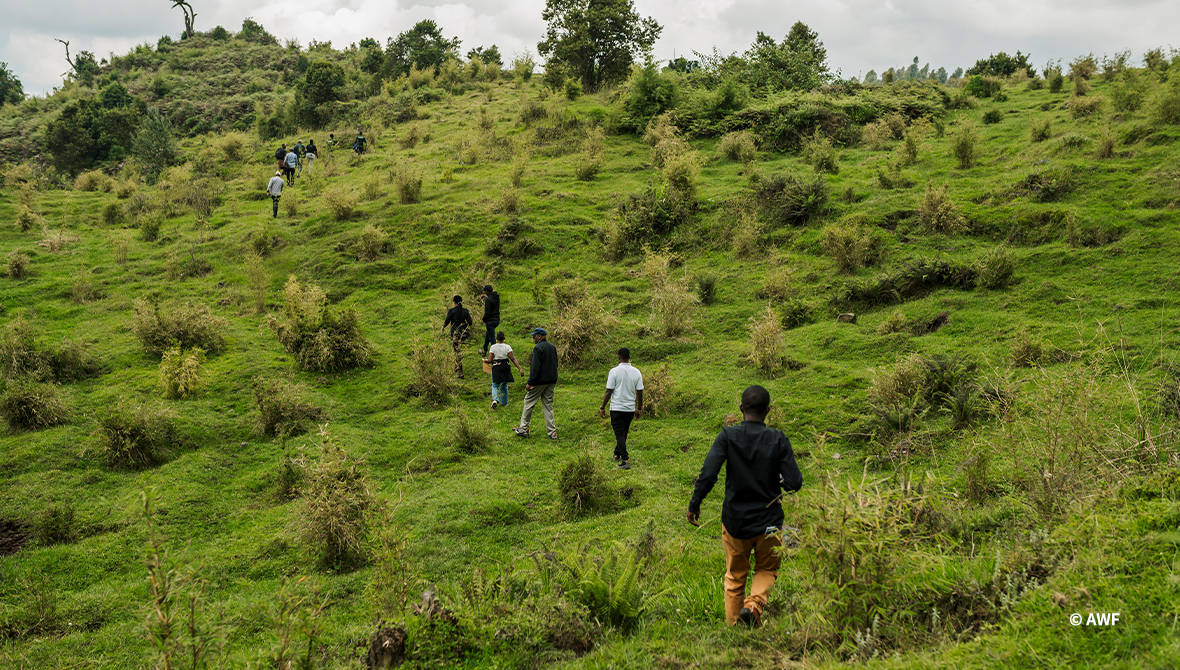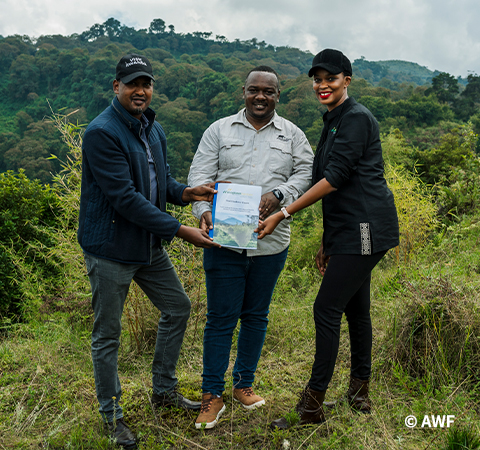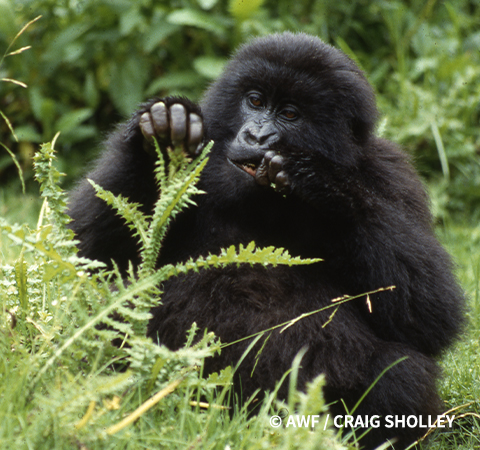International Day of Biodiversity: AWF’s Pioneering Role in Rwanda’s Conservation Success

Representatives from the Rwanda Development Board, the African Wildlife Foundation, and EcoPlanet Bamboo Rwanda walked through the restored park area.
Rwanda's captivating landscapes and diverse wildlife serve as more than just a source of national pride; they are also a cornerstone of its economy. Tourism, driven largely by the allure of mountain gorillas, contributes an estimated 10% to Rwanda's GDP.
On this International Day of Biological Diversity, we caught up with Patrick Nsabinama, AWF's Program Manager at Volcanoes National Park, about the recent handover of 27 hectares of restored land to the park. This collaborative effort between AWF, the Rwanda Development Board (RDB), and EcoPlanet Bamboo Rwanda signifies a significant step towards sustainable conservation in Rwanda.

AWF Rwanda Program Manager Patrick Nsabimana (center) joined Rwanda Development Board Head of Conservation Development Eugene Mutangana and Sharon Umuratwa, GM EcoPlanet Bamboo Rwanda, during the handover of the restored land.
Established in 1925, Volcanoes National Park is a sanctuary for mountain gorillas. Despite their endangered status, the species recovery is a remarkable conservation success story.
Q: Can you elaborate on the significance of the 27 hectares of restored land that AWF handed over to the Rwanda Development Board (RDB) for inclusion in Volcanoes National Park?
Nsabinama: In 2018, AWF recognized the growing pressure on Volcanoes National Park, especially considering it shelters roughly a third of the world's remaining mountain gorillas. To address this, we partnered with the Rwanda Development Board (RDB) to support the park's expansion. Our contribution included donating 27 hectares of restored land—a critical addition that increases the park's size and provides much-needed space for these endangered creatures. We partnered with EcoPlanet Bamboo Rwanda to ensure a comprehensive Forest Landscape Restoration. This meticulous process involved planting native bamboo species (Yushania alpina) alongside indigenous trees and shrubs. The restored land creates a thriving ecosystem that benefits mountain gorillas and fosters habitat connectivity for golden monkeys and other park residents.
Q: How will the recent expansion of Volcanoes National Park's habitat contribute to the long-term conservation and sustainability of the mountain gorilla population?
Nsabinama: The land restoration is a significant step towards the long-term conservation and sustainability of the mountain gorilla population in Volcanoes National Park. It provides much-needed additional space for mountain gorillas, which allows for a larger, healthier population with reduced competition for resources like food and shelter. Previously fragmented habitats could restrict the movement of gorillas and increase human-wildlife conflict. This expansion helps to connect existing gorilla habitats, allowing for safer movement and improved population dynamics.

Volcanoes National Park is part of the Virunga landscape—one of only two habitats in the world for mountain gorillas.
Q: How do the AWF’s conservation efforts in Volcanoes National Park contribute to overall biodiversity gains?
Nsabinama: AWF’s successful conservation initiatives in Rwanda have created a self-sustaining ecosystem that significantly bolsters biodiversity. This land restoration in Volcanoes National Park has expanded habitat availability for endangered species such as mountain gorillas and golden monkeys, thereby contributing to their survival and population growth. Moreover, the enhanced ecological integrity of Volcanoes National Park plays a crucial role in the overall health and resilience of the protected area. This benefits the wildlife inhabiting the park and positively impacts local communities. The park’s robust ecosystem supports eco-tourism, a significant source of income for these communities.
Q: Looking ahead, how do we ensure the continued success of biodiversity conservation in Rwanda?
Nsabimana: AWF is actively engaged in ensuring both the restored ecosystem's health and the continued benefits for local communities. We actively engage with local communities surrounding the park. We provide training programs focused on conservation practices and sustainable resource management. This empowers communities to become stewards of the restored ecosystem, fostering a sense of ownership over its future. AWF works closely with park authorities, the Rwanda Development Board, and other partners to ensure the project aligns with broader conservation goals for Volcanoes National Park. This collaborative approach fosters a sense of shared responsibility and maximizes the project's long-term impact.
>>International Day of Biodiversity: How AWF Fuels Biodiversity Conservation in Africa